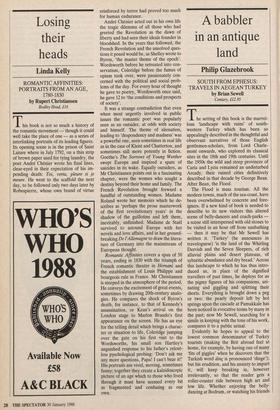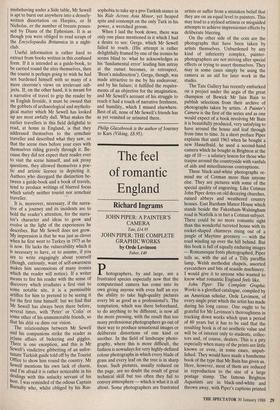A babbler in an antique land
Philip Glazebrook
SOUTH FROM EPHESUS: TRAVELS IN AEGEAN TURKEY by Brian Sewell Century, £12.95 The setting of this book is the marvel- lous 'landscape with ruins' of south- western Turkey which has been so appealingly described in the thoughtful and observant narratives of those English gentlemen-scholars, from Lord Charle- mont onwards, who explored its classical sites in the 18th and 19th centuries. Until the 1950s the wild and steep provinces of Caria and Lycia remained an undisturbed Arcady, their ruined cities definitively described in that decade by George Bean. After Bean, the Flood.
The Flood is mass tourism. All the modern towns, much of the sea-coast, have been overwhelmed by concrete and fore- igners. If a new kind of book is needed to describe to its new visitors this altered scene of belly-dancers and coach-parks — a scene still interspersed with old stones to be visited in an hour off from sunbathing — then it may be that Mr Sewell has written it. 'Turkey' (he announces in traveloguese) 'is the land of the Whirling Dervish and the Seven Sleepers, of rich alluvial plains and desert plateaus, of sybaritic abundance and dry bread.' Across this landscape to which he has thus intro- duced us, in place of the dignified travellers of past times, he deploys for us the pigmy figures of his companions, uri- nating and giggling and splitting their shorts. Everything is brought down a peg or two: the pearly deposit left by hot springs upon the cascade at Pamukkale has been noticed in evocative terms by many in the past; now Mr Sewell, searching for a simile in keeping with the tone of his work, compares it to a public urinal.
Evidently he hopes to appeal to the lowest common denominator of Turkey tourists (making the Brit abroad feel at home, for example, by having one of many 'fits of giggles' when he discovers that the Turkish word ding is pronounced `dinge'); but his erudition, and his anxiety to impart it, will keep breaking in, however irrelevantly, so that the reader gets a roller-coaster ride between high art and low life. Whether enjoying the belly- dancing at Bodrum, or watching his friends misbehaving under a Side table, Mr Sewell is apt to burst out anywhere into a densely- written dissertation on Harpies, or St Nicholas, or the number of breasts posses- sed by Diana of the Ephesians. It is as though you were obliged to read scraps of the Encyclopaedia Britannica in a night- club.
Useful information is rather hard to extract from books written in this confused form. If it is intended as a guide-book, to be carried round the sites themselves, then the tourist is perhaps going to wish he had not burdened himself with so many of a mere cicerone's views on irrelevant sub- jects. If, on the other hand, it is meant for a narrative of travel to grip the reader by an English fireside, it must be owned that the gobbets of archaeological and mytholo- gical matter which Mr Sewell has looked up are most awfully dull. What makes the earlier travellers in this field delightful to read, at home in England, is that they addressed themselves to the armchair traveller and described what they saw, so that the scene rises before your eyes with themselves riding gravely through it. Be- cause they did not expect their reader ever to visit the scene himself, and ask prosy questions, they allowed themselves a poe- tic and artistic licence in depicting it. Authors who disregard the distinction be- tween a guide-book and a book of travels, tend to produce writings of blurred focus which satisfy neither tourist nor armchair traveller.
It is, moreover, necessary, if the narra- tive of a journey and its incidents are to hold the reader's attention, for the narra- tor's character and ideas to grow and evolve in the light of the experiences he describes. But Mr Sewell does not grow. My impression is that he was just as clever when he first went to Turkey in 1975 as he is now. He lacks the vulnerability which it is necessary to have, or to assume, if you are to write engagingly about yourself (though, curiously, want of self-awareness makes him unconscious of many ironies Which the reader will notice). If a writer means to fire his reader with the sense of discovery which irradiates a first visit to some notable site, it is a permissible artifice for him to pretend to be seeing it for the first time himself: but we find that Mr Sewell has always been there before, several times, with 'Peter' or 'Colin' or some other of his unmemorable friends, so that his aid vu dims our vision. The relationships between Mr Sewell and his companions strike the reader as Jejune affairs of bickering and giggles. There is one exception, and this is Mr Sewell's vindictive gibbetting of an unfor- tunate Turkish guide told off by the Tourist Office to show him round the country. Mr Sewell mentions his own lack of charm, and I'm afraid it is rather noticeable in his dealings with this unlucky servant of his host. I was reminded of the odious Captain Burnaby who, whilst obliged by his Rus- sophobia to take up a pro-Turkish stance in his Ride Across Asia Minor, yet heaped spite and contempt on the only Turk in his power, a wretched groom.
When I laid the book down, there was only one place mentioned in it which I had a desire to see: Gerga, which Mr Sewell failed to reach. (His attempt is rather delightfully framed by one of the ironies he seems blind to: what he acknowledges as his 'fundamental error' leading him astray at the outset becomes, in retrospect, 'Bean's misdirection'). Gerga, though, was made attractive to me by his endeavour, and by his failure; it fulfilled the require- ments of an objective for the imagination, and Mr Sewell's account of his struggle to reach it had a touch of narrative freshness, and humility, which I missed elsewhere. Best of all, none of Mr Sewell's friends has as yet vomited or urinated there.
Philip Glazebrook is the author of Journey to Kars (Viking, £8.95).



















































 Previous page
Previous page